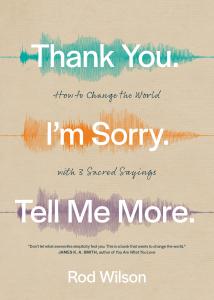
By Rod Wilson
Many of us have acquired definitions of love through popular music and an oversexualized culture. In those two arenas, love makes us feel good, gives us energy, aids our self-esteem, and makes our world go round.
When you experience that kind of love, you’re ecstatic and emotional, overcome by inner sensations, sexual and otherwise, making you feel great. But therein lies the problem: you.
Biblical love is sacrificial, hard work, others-oriented. Engaging in this kind of love might not make you feel good at all. Think of parenting. Loving children is sometimes one of the most painful forms of love one can experience.
Frequently neither the parents nor the child is happy, but doing what is best for the other isn’t always easy. An attentiveness to the other, an inclination in their direction, is a move away from ourselves. That is why the phrase “falling in love” is such a contradiction. Falling requires no energy or effort. But real love requires all of that and more.
For Christians, a life of love is built on the fact that we are loved. Vertical understanding that God loves me opens up my horizontal world, where all others are recipients of my love. All others. Those who are easy to love, and those who are challenging to love. Even enemies. Even Samaritans. Even those who disagree. Even Republicans. Even Democrats.
Our capacity to love the other reflects our understanding of God’s love for us. A seeming inability or apparent unwillingness to love others may reflect a lack of appreciation for his love. Being good with God and not with others isn’t Christian.
Gratitude, remorse, and care are three ways we can acknowledge the other. When we express gratitude to others, communicating that they have influenced us positively, we value them. When we show remorse to others, conveying that we have affected them negatively, we cherish them.
When we communicate care to others, letting them know we want to hear their story, we respect their dignity. In doing so, we are loving people.
But despite what our leader said, we aren’t always known by our love.
There were many positive influences from the church where I grew up, but one of their significant contributions hasn’t served me well: us and them. This was a long time ago, and is no means typical of most contemporary churches, but many of us have had to wrestle through this particular issue.
This simple distinction expressed itself in various ways. Communion was only for certain people, and they would sit in a circle around a table with bread and wine. Just outside the circle were two sets of chairs. The males sat on one side, while the females sat on the other. All the children and several adults were in those outside locations, meaning that children didn’t sit with their parents, and some spouses and singles weren’t part of the circle on Sunday morning. These two sets of chairs were described in various ways: “Seat of the unlearned.” “Goat pen.” “Back seat.”
The economy of that church on a Sunday morning was transparent. Those in the circle were us. Those outside the circle were them.
I remember with pain the not-infrequent experiences of having one of the leaders invite all those in the back seats to go outside. We would get up without our parents, go down the stairs and out to the church’s front lawn. About ten minutes later, people would come out in tears, with sad faces, because someone had been “read out.”
The following week we’d find out who the person was because they’d be seated in the goat pen with the rest of us. Excommunication in our church meant you moved from us to them because of a particular sin. Moving out of the circle into a “seat of the unlearned” was a loud message.
At youth events, we were warned that we shouldn’t become too friendly with two groups of people—non-Christians and Christians outside our particular church brand. High school was such a weird experience for me because only one fellow student was linked with our churches.
The us comprised two people, and the other twelve hundred students were the them— those who were not following Jesus at all or because they were not following him in the right way. My only way to survive was to disobey church rules and have “too many” friends.
When my wife and I left that church and moved from an us to a them position, it was made very clear that we were moving out from under God’s protection and that any pain we experienced could be traced to this less-than-honorable decision.
Several months after my parents left the same church and my father had a heart attack, my mother received a community leader’s visit. As she was sitting on a chair outside her husband’s hospital room, experiencing anguish over his physical well-being, she was told that now she knew which church she should be attending. Leaving us and becoming them had significant medical consequences.
It would be easy to dismiss these events as strange experiences from a time long ago, but us and them is still alive and well.
Within and between churches and Christian nonprofits, individuals and groups continue to allocate members of our tribe into one box or the other. Relational fractures are extensive as we head to our us and them corners. Conservatives demonize liberals based on their beliefs and offer them a seat in the goat pen. Liberals who find conservatives’ behavior out of touch with contemporary thinking point them to their place in the seat of the unlearned.
Those outside the church observe us as we discuss and debate sexism and racism, homophobia and social justice, immigration and globalization, and they sense the thread of fear and anger that pulls a lot of it together. They react not just to the content of our beliefs but to our attitudes toward others.
When they feel like them, as we elevate us, we don’t endear ourselves to them, and they aren’t interested in what we have to offer. It’s hard to comprehend what’s going on in the circle when you’re on the outside looking in.
Where will we find hope?
As diverse perspectives on beliefs and behaviors create distance within the Christian community and between that community and all others, we need to grasp the importance of belonging.
We are connected to one another. Rooted in the way we were created and emphasized throughout biblical material, it’s the way things are. Our responsibility is to express that link by loving the other. No limitations. No escape clauses because of beliefs. No avoidance because of behavior. All are acknowledged, respected, loved. We belong to each other.
When we express “Thank you,” “I’m sorry,” and “Tell me more” to the other, we strengthen our sense of belonging. We don’t just affirm our understanding of God but also acknowledge the dignity of those he has created. We are all his offspring.
The Human Library, housed in Denmark, is a facility where readers can borrow human beings to serve as open books. Suppose you want to find out about a group that has been subjected to prejudice or discrimination because of their social status, ethnic origin, disability, belief, lifestyle, or diagnosis. In that case, this library will provide human interaction to facilitate your learning. Not simply cognitive learning but a personal education.
Library texts have their place, but there’s something unique about being impacted by another person. Christianity is no different. If all we have to offer are concepts and ideas written on the page, even in our sacred text we call the Bible, we miss our faith’s relational nature. Gratitude, remorse, and care are not disembodied concepts written on the pages of this book. They’re much more than that.
 Taken from Thank You. I’m Sorry. Tell Me More.: How to Change the World with 3 Sacred Sayings by Rod Wilson. Copyright ©2022. Used by permission of NavPress. All rights reserved. Represented by Tyndale House Publishers, a Division of Tyndale House Ministries.
Taken from Thank You. I’m Sorry. Tell Me More.: How to Change the World with 3 Sacred Sayings by Rod Wilson. Copyright ©2022. Used by permission of NavPress. All rights reserved. Represented by Tyndale House Publishers, a Division of Tyndale House Ministries.














